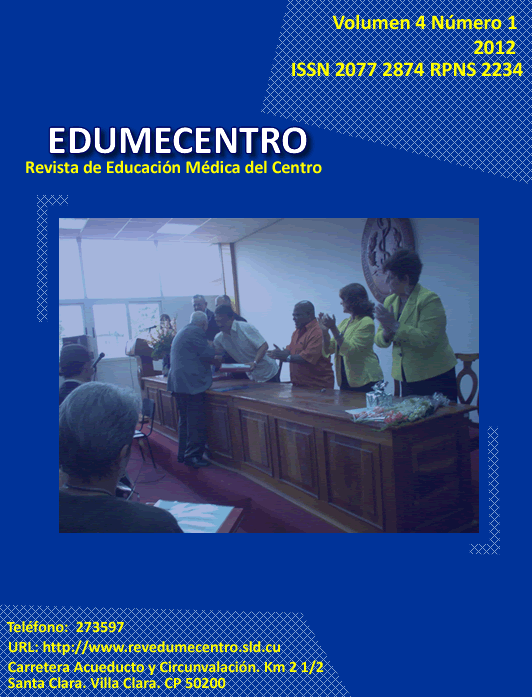Considerations about the contributions to the Cuban medical education of professor Ilizástigui Dupuy, F
Keywords:
Cuban medical education, Fidel Ilizástigui Dupuy, education at work.Abstract
Merit professor Ilizástigui Dupuy, F. (1924–2005), founder of the Cuban Society of Educators in Health Sciences, he has been considered an outstanding representative of the medical education and he left us a rich cultural legacy based on theory as well as in the practice associated to the formation of health professionals in the late 40 years in Cuba. He has a great incidence in the principal problems concerning the medical education at present, especially those dealing with the formation of medical doctors in the XXIs century. Professor Ilizástigui´s conception about the education at work is the core of his pedagogical theory. It defends the interaction of the students with the object of study in real health care scenarios so as to develop professional ways of acting. He puts a strong remark on the fact that the medical practice should not be superseded by the academic or researching components of the formative process.Downloads
Download data is not yet available.
Published
2013-02-14
How to Cite
1.
Fernández Sacasas J. Considerations about the contributions to the Cuban medical education of professor Ilizástigui Dupuy, F. EDUMEC [Internet]. 2013 Feb. 14 [cited 2026 Feb. 13];4(1):104-10. Available from: https://revedumecentro.sld.cu/index.php/edumc/article/view/160
Issue
Section
ARTÍCULO DE REVISIÓN
License
Los autores que publican en esta revista están de acuerdo con los siguientes términos:- Los autores/as conservarán sus derechos de autor y ceden a la revista el derecho de primera publicación de su obra, el cuál estará simultáneamente sujeto a una Licencia Creative Commons Reconocimiento-NoComercial-CompartirIgual 4.0 Internacional (CC BY-NC-SA 4.0) que permite a terceros compartir la obra siempre que se indique su autor y su primera publicación esta revista.
- Los autores pueden establecer por separado acuerdos adicionales para la distribución no exclusiva de la versión de la obra publicada en la revista (por ejemplo, situarlo en un repositorio institucional o publicarlo en un libro), con un reconocimiento de su publicación inicial en esta revista.
- Se permite y se anima a los autores a difundir sus trabajos electrónicamente (por ejemplo, en repositorios institucionales o en su propio sitio web) antes y durante el proceso de envío, ya que puede dar lugar a intercambios productivos, así como a una citación más temprana y mayor de los trabajos publicados (Véase The Effect of Open Access) (en inglés).










